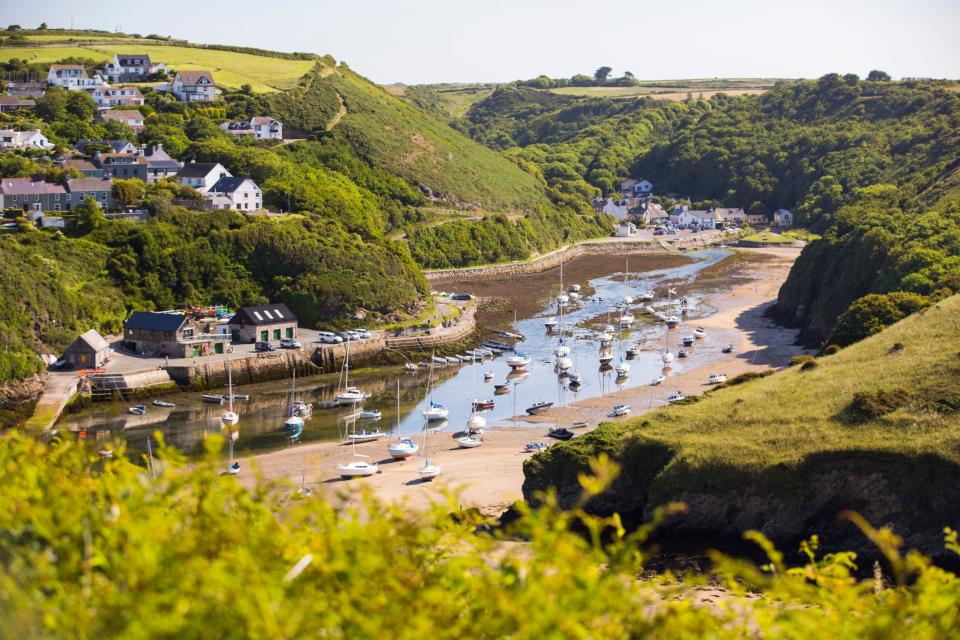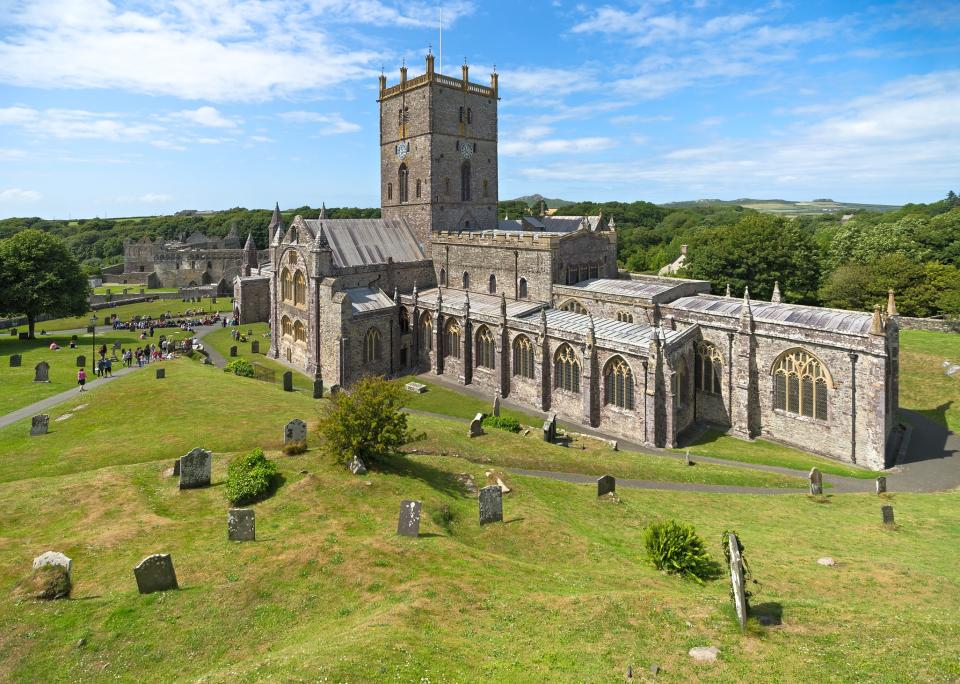Breezy, beautiful Pembrokeshire is the salve for your lockdown lethargies

When lockdown came into force in Wales in late March, my world shrank to a single valley in the Cambrian Mountains. It could have been worse, I told myself: the views were pretty, the walks abundant, the slow pace of life little changed. But after months of being restricted to a five-mile radius, I was climbing the walls. And dreaming of the not-so-distant coast: Pembrokeshire to be exact.
Fast-forward to mid-August and that’s where I was heading with my partner, joining a trickle of holiday traffic on the A487 north of Haverfordwest. I felt an irrepressible tingle of excitement as finally the Atlantic slid into view beyond a bank of pebbles. Storm Ellen was battering the living daylights out of Newgale, with high winds and waves thrashing its two-mile beach.
Parking was scarce, but we found a space and dashed over to a coffee van for change – cash being so rarely needed these days. The campsite was full, too: bedraggled campers trying to peg down tents and desperately clinging on to picnic blankets.
If the Welsh weather was doing a poor job of promoting the delights of a staycation, the beach was a reminder of how savagely beautiful the Pembrokeshire coast can be – so vast that social-distancing didn’t even enter the equation. The stiff wind blew away all the anxiety, lethargy and uncertainty of the past few months. There were dramatic caves, crags and rockpools to explore. Spindrift whipped across the sea. The oxygen, the iodine and the open horizon filled us with hope.
Changing sandals to shoes, we took a quiet five-minute drive inland to our insanely romantic escape for the night: Roch Castle, a Norman fortification with eyrie-like views of coast and country, which now bears the slickly avant-garde hallmark of architect and art collector Keith Griffiths.
There were other guests, apparently, but we’d never have guessed – the place seemed silent, staff were invisible unless you needed them. There was check-in via an app to minimise contact, breakfast and honesty bar drinks could be pre-ordered, and masks (obligatory in public spaces) were provided. So after a temperature check, we were free to enjoy what felt like a long-overdue treat: a glass of fizz in a room with a view of the storm-tossed sea.

Roch was just minutes from the briny seafront in Solva, where chalk-coloured cottages lead down to a deep thumbprint of a harbour. We had our eye on a platter of boat-fresh shellfish from Mrs Will the Fish, but the storm snuffed out that idea so instead we snagged the last table for a late lunch at MamGu.
Masks, social distancing and well-spaced tables aside, the easygoing vibe was deliciously reminiscent of a pre-pandemic world. We sipped locally roasted coffee and ate oven-warm Welsh cakes – working our way greedily through the flavour spectrum: from leek and cheese to ginger and chilli-chocolate.
As the storm began to lift, we made our way north along the coastal road to St Davids, Britain’s smallest city. Its huge medieval cathedral was open for one household group at a time, with a one-way ‘pilgrim route’ system in operation.

St Davids had a cheerful holiday buzz and was firmly open for business. Restaurants were fully booked days in advance, there were snaking queues for ice cream. Attempts were made at social distancing on the narrow high street, but just a fraction of people were wearing masks in shops, the rules being somewhat laxer in Wales than in England.
After leaving our luggage at Penrhiw, a late-Victorian priory turned minimalist-chic hideaway set in acres of landscaped grounds, we set off for the nearby Bug Farm and Grub Kitchen. This is the joint venture of Dr Sarah Beynon, an academic entomologist, ecologist and farmer, and her husband Andy Holcroft, a chef who has carved out a one-of-a-kind niche in Britain by championing local produce and edible insects on surprisingly gourmet menus.
“Most people find the undergrowth disgusting,” admitted Sarah. “But insects are the way forward to a more sustainable future in a world that eats too much meat. Our aim is to increase awareness so people can better appreciate them.”
After we’d had a wander around the wildflower meadows, bug museum and gallery, Andy delivered lunch in the form of chillied crickets, mealworm-topped tomatoes, a jackfruit and VEXo (insect and plant protein mince) burger and insect-studded pakoras, which would have been delicious even if we didn’t know what was in them.
Julia and John Mansfield at Wild About Pembrokeshire share a similar love of the Welsh wilderness. We joined the passionate foraging couple later that afternoon on the popular surfing beach of Whitesands for a lesson in seaweed. We were joined by around 20 other would-be foragers, socially distancing as best we could while gathering laver, sea lettuce and wrack from the shore.

“All the world’s problems can be solved right here,” enthused John, nodding to the seaweed-tangled rocks. “Aches, pains, arthritis. Iodine deficiency. Biofuels for the aviation industry. Global hunger. You name it.”
The couple’s enthusiasm for foraging became even clearer when we popped into the new Really Wild Food Emporium, their lockdown conversion of a striking Art Deco building in central St Davids, currently open for take-away dishes like spiced aubergine and pepper dulse burritos and cakes laced with seaweed and other foraged ingredients.
As lovely as St Davids was, however, we were craving more coastal solitude, and this we found by edging further north to Fishguard. Chris and Helen Sheldon at the Manor Town House, a beautifully converted Georgian building, saw bookings “go through the roof” post lockdown. But despite the sudden spike in guests, the stylish retreat had a remarkably peaceful feel, amplified by the big sea views from the bay windows. Continental breakfast, delivered to the room, was more impressive than it sounded, with Welsh yoghurt, fresh pastries, fruit skewers and still-warm bread.
After breakfast, we walked the stretch of the Pembrokeshire Coast Path meandering northwest towards Strumble Head, picking our way along clifftops flecked with gorse and rosebay willowherb. We were the only hikers on this lonely stretch of coastline. A seal colony barked a welcome on an inaccessible smuggler’s cove far below. And despite a sky threatening rain, for a split second all seemed well with Wales and the world beyond.


